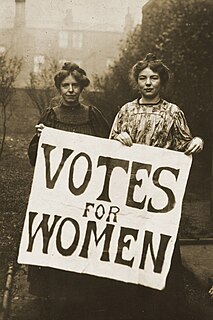 W
WWomen's rights are the rights and entitlements claimed for women and girls worldwide. They formed the basis for the women's rights movement in the 19th century and the feminist movements during the 20th and 21st centuries. In some countries, these rights are institutionalized or supported by law, local custom, and behavior, whereas in others, they are ignored and suppressed. They differ from broader notions of human rights through claims of an inherent historical and traditional bias against the exercise of rights by women and girls, in favor of men and boys.
 W
W"Ain't I a Woman?" is a speech, delivered extemporaneously, by Sojourner Truth (1797–1883), born into slavery in New York State. Some time after gaining her freedom in 1827, she became a well known anti-slavery speaker. Her speech was delivered at the Women's Convention in Akron, Ohio, in 1851, and did not originally have a title.
 W
WAn anonymous birth is a birth where the mother gives birth to a child without disclosing her identity, or where her identity remains unregistered. In many countries, anonymous births have been legalized for centuries in order to prevent formerly frequent killings of newborn children, particularly outside of marriage.
 W
WA Call to Action: Women, Religion, Violence, and Power is a 2014 book by former US president Jimmy Carter. The Pittsburgh Post-Gazette reviewed the book as "A tour de force of the global abuse and manipulation of women" and commended Carter's presentation of statistical data.
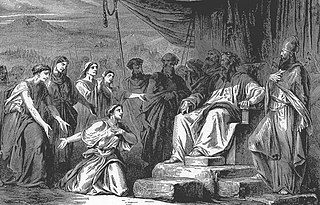 W
WThe Daughters of Zelophehad were five sisters - Mahlah, Noa, Hoglah, Milcah, and Tirzah - mentioned in the Biblical Book of Numbers. They lived during the Israelites' Exodus from Egypt as they prepared to enter the Promised Land and who raised before the Israelite community the case of a woman's right and obligation to inherit property in the absence of a male heir in the family. Zelophehad, a man of the Tribe of Manasseh, had five daughters but no sons, and therefore no male heirs.
 W
WEducating Rita is a 1983 British comedy-drama film directed by Lewis Gilbert with a screenplay by Willy Russell based on his 1980 stage play. The film stars Michael Caine, Julie Walters, Michael Williams and Maureen Lipman. It won multiple major awards for best actor and best actress and was nominated for three Academy Awards.
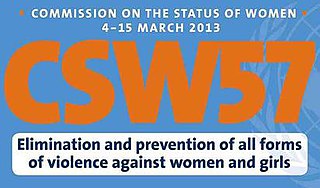 W
WThe Expert Group Meeting (EGM): prevention of violence against women and girls was convened as part of the United Nations Commission on the Status of Women's multi-year programme of work for 2010-2014. The "Elimination and prevention of all forms of violence against women and girls" forms a priority theme for its fifty-seventh session in 2013 (CSW57). The meeting took place in Bangkok, Thailand, 17–20 September 2012 and was organised by the United Nations Entity for Gender Equality and the Empowerment of Women, in collaboration with the following organisations:United Nations Economic and Social Commission for Asia and the Pacific (ESCAP); United Nations Development Programme (UNDP); United Nations Population Fund (UNFPA); United Nations Children's Fund (UNICEF) and; World Health Organization (WHO).
 W
WThe Equality Amendment is a proposed Amendment to the U.S. Constitution by legal scholars Kimberlé Crenshaw and Catharine MacKinnon. It was first proposed in December 2019 in the Yale Law Journal. This proposal is an updated version of the Equal Rights Amendment written by Alice Paul from the National Women's Party, which was first proposed in 1923 and has not been ratified. This is different from the 2021 Equality Act, which has been proposed in Congress to prohibit discrimination based on biological sex, gender identity or sexual orientation.
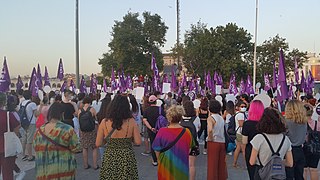 W
WFemicide in Turkey refers to murder cases in which women are killed for reasons related to their social roles, such as being killed on the grounds of "honor cleansing".
 W
WThe Global Implementation Plan to End Violence Against Women and Girls was a recommendation from the multi-agency Expert Group Meeting (EGM) on the prevention of violence against women and girls. The meeting was convened as part of the United Nations Commission on the Status of Women's multi-year programme of work for 2010–2014.
 W
WHeForShe, often referred to as He for She, is a solidarity movement for the advancement of gender equality, initiated by the United Nations. Grounded in the idea that gender inequality is an issue that affects all people, socially, economically and politically, HeForShe is a global effort that seeks to involve men and boys in achieving equality by taking action against negative gender stereotypes and behaviors. Its logo represents the union of women and men working together to achieve gender equality, by joining together aspects of both the female and male symbols.
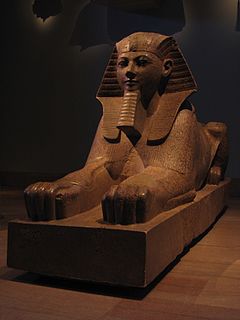 W
WAn honorary male or honorary man is a woman who is accorded the status of a man without disrupting the patriarchal status quo. Such a woman might be considered "one of the guys" by the men she associates with.
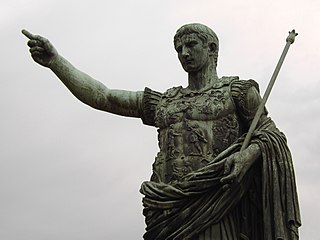 W
WThe ius trium liberorum, meaning "the right of three children" in Latin, was a privilege rewarded to Roman citizens who had produced at least three children or freedmen of either sex who had produced at least four children. It was a direct result of the Lex Iulia and the Lex Papia Poppaea, laws introduced by Augustus in 18 BC and 9 AD, respectively. These laws were intended to increase the dwindling population of the Roman upper classes. However, they seem to have also had an important secondary function in the rewarding of amicitia, as the "importance of legacies to Martial and Suetonius can be deduced from their (successful) efforts to obtain the ius trium liberorum"
 W
WLactivism is the doctrine or practice of vigorous action or involvement as a means of achieving a breastfeeding culture, sometimes by demonstrations, protests, etc. of breastfeeding. Supporters, referred to as "lactivists", seek to protest the violation of International Code of Marketing of Breast-milk Substitutes by formula companies and industry.
 W
WThe legal rights of women refers to the social and human rights of women. One of the first women's rights declarations was the Declaration of Sentiments. The dependent position of women in early law is proved by the evidence of most ancient systems.
 W
WThe Moser Gender Planning Framework is a tool for gender analysis in development planning. It was developed by Caroline Moser. The goal is to free women from subordination and allow them to achieve equality, equity, and empowerment.
 W
WMy body, my choice is a feminist slogan used in several countries, most often surrounding issues of bodily autonomy and abortion.
 W
WPotty parity is equal or equitable provision of public toilet facilities for females and males within a public space.
 W
WThe Preventing and Combating Violence Against Women and Domestic Violence Act 2017 is an act of the Parliament of the United Kingdom. The act made provisions for the ratification of the Istanbul Convention and set out a reporting process for the Secretary of State. It was introduced to Parliament as a private members bill by Eilidh Whiteford and Baroness Gale.
 W
WRefugee women face gender-specific challenges in navigating daily life at every stage of their migration experience. Common challenges for all refugee women, regardless of other demographic data, are access to healthcare and physical abuse and instances of discrimination, sexual violence, and human trafficking are the most common ones. But even if women don't become victims of such actions, they often face abuse and disregard for their specific needs and experiences, which leads to complex consequences including demoralization, stigmatization, and mental and physical health decay. The lack of access to appropriate resources from international humanitarian aid organizations is compounded by the prevailing gender assumptions around the world, though recent shifts in gender mainstreaming are aiming to combat these commonalities.
 W
WCäcilia (Cillie) Rentmeister is a German art historian, culture scientist and researcher of cultural conditions of women and of gender. In addition to studying the different realities in which men and women are living, she has concerned herself with the matriarchy.
 W
WReproductive justice is "the human right to maintain personal bodily autonomy, have children, not have children, and parent the children we have in safe and sustainable communities," according to SisterSong Women of Color Reproductive Justice Collective, the first organization founded to build a reproductive justice movement. In 1997, 16 women-of-color-led organizations representing four communities of color – Native American, Latin American, African American, and Asian American – launched the nonprofit SisterSong to build a national reproductive justice movement. Additional organizations began to form or reorganize themselves as reproductive justice organizations starting in the early 2000s.
 W
WRima Salah is currently the chair of the Early Childhood Peace Consortium (ECPC) and is an assistant clinical professor at the Child Study Center, Yale School of Medicine.
 W
WTehzeeb-e-Niswan was an Islamic weekly magazine for women, started by Sayyid Mumtaz Ali along with his wife Muhammadi Begum in 1898. It is regarded as the pioneering work on women rights in Islam. It was published from Lahore between 1898 and 1949.
 W
WTopfreedom is a cultural and political movement seeking changes in laws to allow women to be topless in public places where men are permitted to be barechested, as a form of gender equality. Specifically, the movement seeks the repeal or overturning of laws which restrict a woman's right not to have her chest covered at all times in public.
 W
WA Vindication of the Rights of Woman: with Strictures on Political and Moral Subjects (1792), written by the 18th-century British proto-feminist Mary Wollstonecraft, is one of the earliest works of feminist philosophy. In it, Wollstonecraft responds to those educational and political theorists of the 18th century who believed that women should not receive a rational education. She argues that women's education ought to match their position in society, and that they are essential to the nation because they raise its children and could act as respected "companions" to their husbands. Wollstonecraft maintains that women are human beings deserving of the same fundamental rights as men, and that treating them as mere ornaments or property for men undercuts the moral foundation of society.
 W
WWomen's parking spaces are specially designated and identified parking spaces in parking garages and parking lots to be used by women. They are usually near exits to increase the safety of women, to facilitate parking, or to facilitate walking to shopping or employment destinations.
 W
W"Women's rights are human rights" is a phrase used in the feminist movement. The phrase was first used in the 1980s and early 1990s. Its most prominent usage is as the name of a speech given by Hillary Rodham Clinton, the First Lady of the United States, on September 5, 1995, at the United Nations Fourth World Conference on Women in Beijing. In this speech, she sought to closely link the notion of women's rights with that of human rights. In the speech, Clinton used the phrase within the longer, bidirectional refrain, "human rights are women's rights and women's rights are human rights."
 W
WThe Fourth World Conference on Women: Action for Equality, Development and Peace was the name given for a conference convened by the United Nations during 4–15 September 1995 in Beijing, China.